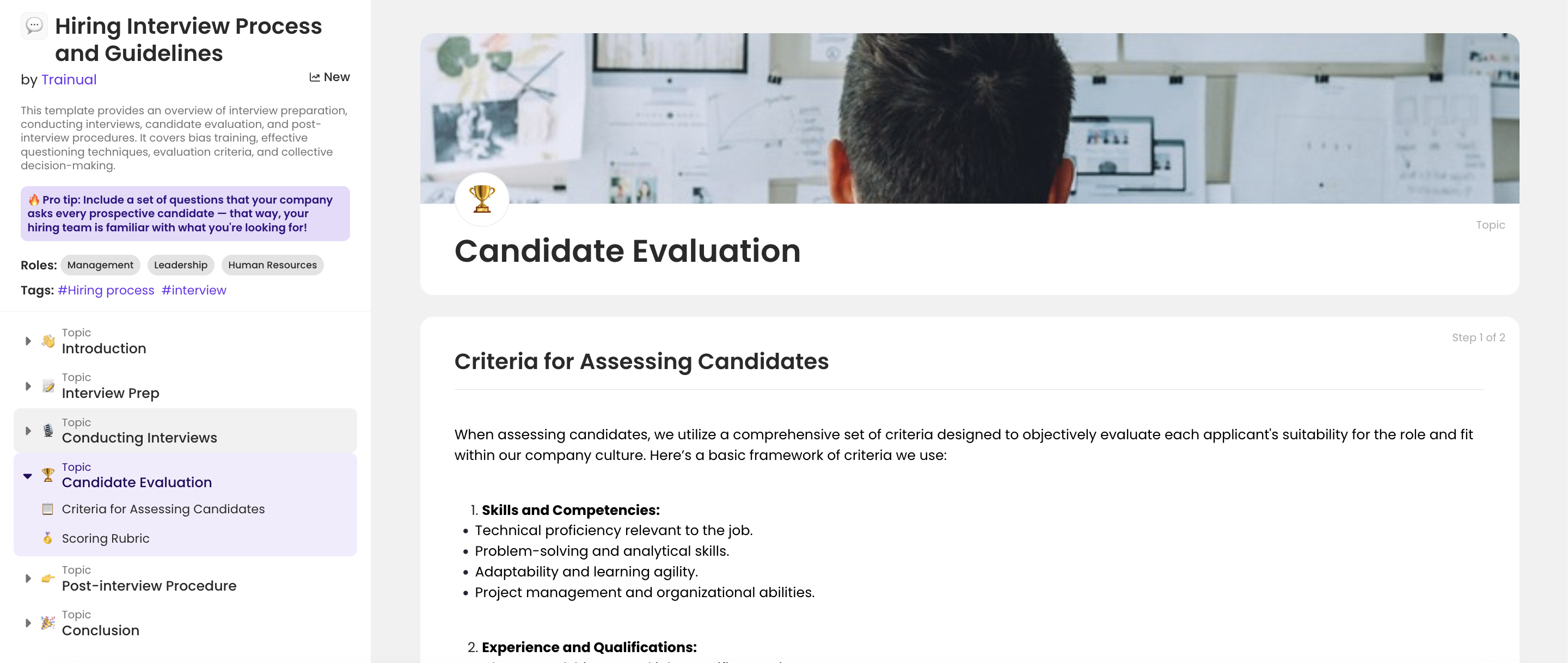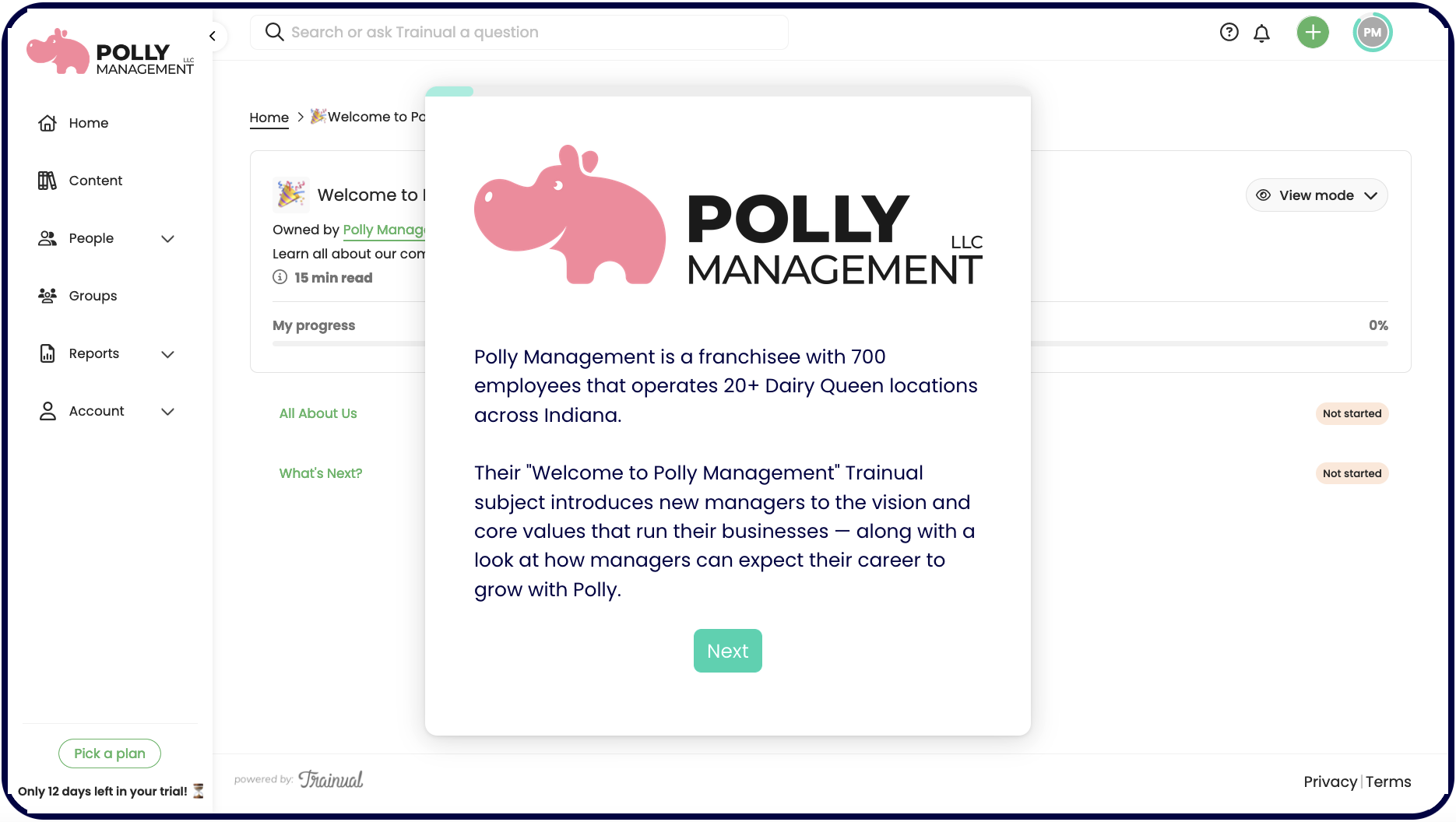Too much on your plate? Start delegating the right way.
May 1, 2024

Psst, are you busy today? (Okay, maybe that’s a dumb question — who isn’t?) Because the U.S. Small Business Administration is hosting a virtual summit for National Small Business Week — and you can get in on the day 2 action right now!
For this week’s stories:
- Outline your hiring interview process with this template.
- The best way to plan the delegation of your responsibilities.
- What promotion paths could look like in your employee training.
- And how to leapfrog your competition to become customer’s #1 choice.
STARTER PACK
Template of the week: Hiring Interview Process and Guidelines

If you were to pick just one operation your business needs to get right, what would it be? (Yes, just one. We know it’s tough.)
You might have picked something like sales or customer service. (Makes sense, you want to snag those customers and make them happy so they keep coming back — win, win, win.) But no matter which operation you chose, the fact of the matter is that it’ll only be successful if you have the right people behind it.
So, we’d argue that hiring is one of the most important operations in your business — since the success of all others stems straight from it. (Is that answer cheating? 🤷)
👉 Be sure you have best practices documented for your hiring team with our Hiring Interview Process and Guidelines template. It covers everything from preparation to conducting interviews and candidate evaluations to post-interview procedures. It even includes bias training and the process for collective decision-making.
Check out our entire template archive of free and customizable policy, process, and role starters. New to Trainual? Get a demo.
ROLE PATROL
3 options for delegating roles and responsibilities across your business
One of the biggest responsibilities you have as a business leader is keeping tabs on where your people are spending their time. (Hopefully they’re not too busy putting stuff in Jell-O like these hotel workers. #DammitJim.)

But more importantly, you need to recognize where employees should be spending their time — and delegate responsibilities accordingly.
Woof, I feel called out. I don’t keep track of this as much as I should.
We get it. Delegating roles and responsibilities can be not only confusing, but insanely time-consuming. Scribbling down someone’s responsibilities, only to erase them and re-scribble them for someone else (over and over again) can leave your hand cramped and your patience stretched thin.
But when you map it all out, you can clearly see what needs to be prioritized, who's got too much on their plate, and who's best suited for each responsibility. That way, you can delegate accordingly — helping you build a more engaged and productive team, optimize resource allocation, streamline operations, and so much more.
Let’s go over your three main options to plan out responsibility delegation in your business:
- Hire a consultant: Great for getting an outside perspective on your org, less great for your wallet.
- Plan manually using classic tools (like whiteboards, spreadsheets, and docs): Helps you visualize exactly what needs to happen — but too bad it takes a lot of time and effort.
- Use the Trainual Delegation Planner (AKA, the new kid on the block): An easy-to-use tool for gauging responsibilities, evaluating time commitments, and delegating tasks — all built into your business playbook.
👉 Learn more about all three methods.
TRAINUAL TIPS & TRICKS
Preparing teammates for promotion straight from onboarding
Like many franchisees, Polly Management faced the challenge of ensuring consistent operations across their many locations. With around 700 employees, the multi-unit restaurant company operates 26 Dairy Queen locations along with pizza and Mexican food brands across an expansive territory covering Michigan down to Southern Indiana.
They wanted company-wide alignment on policies, procedures, and cultural philosophies for their 190 managers, along with an easily digestible way to share their unique “Pathway to Promotion” for teammates.
Check out how they are streamlining their company introduction. 👇

👉 Plus, some other reasons Polly Management loves Trainual.
PICKED LAST
The 3 ways to become your customers’ first choice

“You were not my first choice.” Ouch. 🥲
Not something you want to hear from the customers you cater to and cherish. We get it — competition is fierce — but that’s no excuse for letting other businesses tempt away your customers. Especially when there are three key ways to win customers over:
1. Listen and learn.
“Provide a great experience and get customers to recommend your business” — that’s customer experience (CX) 101. But rather than just measure how likely a customer is to do that (which is what most companies do), the idea is to find out why customers are recommending you, so you can repeat it over and over (and over) again.
The way to do this? Tailor your feedback questions for each customer profile so you know exactly what they like. Then (you guessed it), just do that.
2. Personalization.
Feedback isn’t a one-size-fits-all — it should be personalized to what your customer actually came to you for. A single “How was your experience?” isn’t gonna tell you much. But asking about the specific products and services makes questions and surveys more relevant and personalized to customers — helping you more down the line.
3. The right measurement.
If you want to see improvement in your CX and make your business the number one choice, measure improvement rates amongst your team. And celebrate when your team members hit their target goals — it builds up your employees, who in turn will use their best practices to create new advocates for your business.




